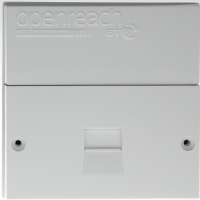Moving a BT or Virgin Media master socket
Can I move my own BT or Virgin Media master socket?

Your telephone service from any of the UK Service Providers, other than Virgin Media, is presented at your home or business on a master socket provided by Openreach (formerly BT Openreach, BTOR), and often referred to as 'the BT master socket'. This is the point where Openreach's responsibility for the line ends, and your responsibility begins. Everything up to the master socket belongs to Openreach. Virgin Media also use similar master sockets for their telephone service, and everything up to their master socket belongs to Virgin Media.
So can you move it?
We are not lawyers and have not taken legal advice, but we do have a great deal of experience in telecommunications. We suspect, but do not know for sure, that you are not supposed to move it yourself. However, there are lots of people, many of whom are ex-Openreach and ex-BT engineers, who can and do move BT and Virgin Media master sockets and offer their services to do so. We have yet to hear of a single one of them being instructed by Openreach or Virgin to desist from moving master sockets. What you risk when moving your master socket is not a fine, not a strongly-worded letter from Openreach or Virgin and not an unpleasant visit from a jobsworth working for Openreach or Virgin; what you risk is getting it wrong then having to pay your Service Provider to put it right.
Use the proper cable
Telephone cable, proper telephone cable, the kind we use and other processionals use, is made of copper wire and complies with a standard such as CW1308. Unfortunately, there are many suppliers who offer cheap substandard cable that is sold as 'telephone cable' but does not comply with the standards.
Two things to look out for are copper-coated steel (CCS) and copper-coated aluminium (CCA). Neither of these are telephone cable, regardless of what it says on the drum.
CCS is far too stiff and breaks the connectors when inserted into them, as well as breaking or damaging the insertion tool used to put the wires in the connectors.
CCA, on the other hand, is much softer. CCA won't break the connectors or the tools but it won't make proper contact in the connectors, leading to poor connections, noise, and, if there is DSL on the line, a slow or unstable internet connection.
Neither Openreach nor Virgin use CCS or CCA, so if you move your master socket and don't use proper telephone cable to the correct specification and there is a problem, their engineer will know what has happened and will charge for putting it right.
Use the proper tools
Telephone wire is normally terminated in an insulation displacement connector (IDC), which works by pushing the wire between 2 closely-spaced metal forks. The metal forks are designed to cut through the insulation on the wire and make contact with the copper conductor inside without damaging the wire.
To do this properly requires the use of a punch down tool, also know as a Krone tool after the company that invented the technology. Professional punch down tools are available for about £5 to £15. Cheaper plastic tools suitable for a small number of uses are available for a few pence. They are also sometimes supplied with telephone extension kits.
Attempts to push the wires into the connectors with something else, such as a knife or screwdriver, generally result in damage to the IDC, which then causes a poor connection, resulting in noise or a line that doesn't work at all. The damage caused to IDCs by screwdrivers, knives, etc. is obvious to anyone trained in telecommunications and, if detected by Openreach or Virgin when they come to fix the inevitable fault, will result in a charge for replacing the damaged parts.
Get help if you are not sure
We have many years' experience in telecoms, including moving BT, Openreach and Virgin master sockets. If you are not sure about doing it yourself, we can do it for you.